Related Research Articles

Julius Henry "Groucho" Marx was an American comedian, actor, writer, and singer who performed in film, television, radio, stage, and vaudeville. He was a master of quick wit and is generally considered to have been one of America's greatest comedians.

The Marx Brothers were an American family comedy act that was successful in vaudeville, on Broadway, and in 14 motion pictures from 1905 to 1949. Five of the Marx Brothers' fourteen feature films were selected by the American Film Institute (AFI) as among the top 100 comedy films, with two of them, Duck Soup (1933) and A Night at the Opera (1935), in the top fifteen. They are widely considered by critics, scholars and fans to be among the greatest and most influential comedians of the 20th century. The brothers were included in AFI's 100 Years... 100 Stars list of the 25 greatest male stars of Classical Hollywood cinema, the only performers to be included collectively.

Animal Crackers is a 1930 American pre-Code Marx Brothers comedy film directed by Victor Heerman. The film stars the Marx Brothers,, with Lillian Roth and Margaret Dumont, based on the Marxes Broadway musical of the same name. Mayhem and zaniness ensue during a weekend party in honor of famed African explorer Captain Jeffrey T. Spaulding. A critical and commercial success upon its initial release, Animal Crackers was shot at Paramount's Astoria Studios in Astoria, Queens, the second film the Brothers would make in New York City.
Freedonia, Fredonia or Fredon is the name given to several fictional countries. The name was used for some aspects of the United States in the 19th century, and later popularized by the 1933 Marx Brothers film Duck Soup where it was the name of the fictional country in which the film was set. Over time, the word has come to have a more generic meaning, anything from a noun describing a plausible yet fictional country, to an adjective ("Freedonian") used to characterize a place like the Freedonia of Duck Soup. Because the Marx Brothers' film had so many qualities—autocracy, diminutiveness, and obscurity, to name but a few—a place can be described as "Freedonian" for having any one of these qualities.
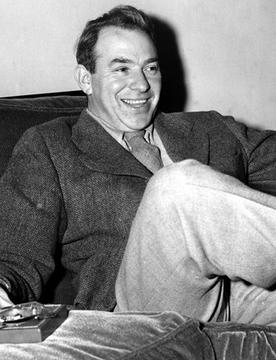
Edgar Yipsel Harburg was an American popular song lyricist and librettist who worked with many well-known composers. He wrote the lyrics to the standards "Brother, Can You Spare a Dime?", "April in Paris", and "It's Only a Paper Moon", as well as all of the songs for the film The Wizard of Oz, including "Over the Rainbow". He was known for the social commentary of his lyrics, as well as his leftist leanings. He championed racial and gender equality and union politics. He also was an ardent critic of religion.

Harold Arlen was an American composer of popular music, who composed over 500 songs, a number of which have become known worldwide. In addition to composing the songs for the 1939 film The Wizard of Oz, including "Over the Rainbow", which won him the Oscar for Best Original Song, he was nominated as composer for 8 other Oscar awards. Arlen is a highly regarded contributor to the Great American Songbook. "Over the Rainbow" was voted the 20th century's No. 1 song by the RIAA and the NEA.

Margaret Dumont was an American stage and film actress. She is best remembered as the comic foil to the Marx Brothers in seven of their films; Groucho Marx called her "practically the fifth Marx brother."

The Trylon and Perisphere were two monumental modernistic structures designed by architects Wallace Harrison and J. Andre Fouilhoux that were together known as the Theme Center of the 1939 New York World's Fair. The Perisphere was a tremendous sphere, 180 feet (55 m) in diameter, connected to the 610-foot (190 m) spire-shaped Trylon by what was at the time the world's longest escalator. The Perisphere housed a diorama by Henry Dreyfuss called Democracity which, in keeping with the fair's theme "The World of Tomorrow", depicted a utopian city-of-the-future. The interior display was viewed from above on a moving sidewalk, while a multi-image slide presentation was projected on the dome of the sphere. After exiting the Perisphere, visitors descended to ground level on the third element of the Theme Center, the Helicline, a 950-foot-long (290 m) spiral ramp that partially encircled the Perisphere.
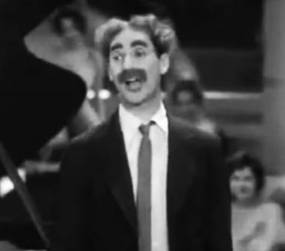
Captain Jeffrey T. Spaulding is a fictional character in the Broadway musical Animal Crackers and the film of the same name. He was originally played by actor Groucho Marx, one of the Marx Brothers, in both productions. Despite his middle name being Edgar, he is known as Jeffrey T. Spaulding; his first name is also spelled as "Geoffrey" in parts of the film.
Lydia was an Iron Age kingdom of western Asia Minor.
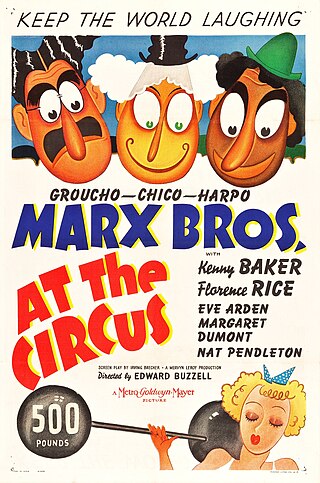
At the Circus is a 1939 comedy film starring the Marx Brothers released by Metro-Goldwyn-Mayer in which they help save a circus from bankruptcy. The film contains Groucho Marx's classic rendition of "Lydia the Tattooed Lady". The supporting cast includes Florence Rice, Kenny Baker, Margaret Dumont, and Eve Arden. The songs, including "Lydia the Tattooed Lady", "Two Blind Loves", and "Step Up and Take a Bow", were written by the team of Harold Arlen and Yip Harburg.

Dr. Teeth and the Electric Mayhem, or simply The Electric Mayhem, are an American Muppet rock group that debuted in 1975 on the pilot for the sketch comedy television series The Muppet Show. They are the house band for The Muppet Show, with personalities and appearances inspired by prominent real-life rock music and jazz performers. They subsequently appeared in various Muppet films and television specials and have also recorded album tracks and covered numerous songs. The Electric Mayhem consists of Dr. Teeth on vocals and keyboards, Animal on drums, Floyd Pepper on vocals and bass, Janice on vocals and lead guitar, Zoot on saxophone, and Lips on trumpet. The band's members were originally performed by Jim Henson, Frank Oz, Jerry Nelson, Richard Hunt, Dave Goelz, and Steve Whitmire, respectively; they are presently performed by Bill Barretta, Eric Jacobson, Matt Vogel, David Rudman, Goelz, and Peter Linz, respectively.
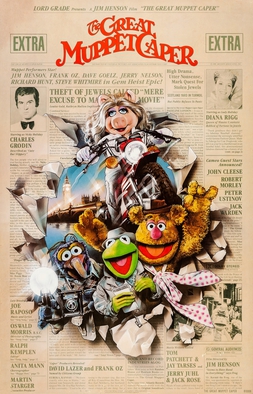
The Great Muppet Caper is a 1981 musical heist comedy film directed by Jim Henson and the second theatrical film featuring the Muppets. The film stars Muppet performers Henson, Frank Oz, Dave Goelz, Jerry Nelson, Richard Hunt, and Steve Whitmire, as well as Charles Grodin and Diana Rigg with special cameo appearances by John Cleese, Robert Morley, Peter Ustinov, and Jack Warden. The film was produced by ITC Entertainment and The Jim Henson Company and distributed by Universal Pictures. In the plot, the Muppets are caught up in a jewel heist while investigating a robbery in London.

The Muppets' Wizard of Oz is a 2005 musical fantasy television film directed by Kirk R. Thatcher, and the third television film featuring the Muppets. The film stars Ashanti, Jeffrey Tambor, Quentin Tarantino, David Alan Grier, Queen Latifah, as well as Muppet performers Steve Whitmire, Dave Goelz, Bill Barretta, and Eric Jacobson. A contemporary adaptation of the 1900 novel The Wonderful Wizard of Oz by L. Frank Baum, the story follows young Dorothy Gale, who works in her Aunt Em's diner, but dreams of becoming a singer somewhere beyond her small Kansas town. Swept up by a tornado, in her trailer home with pet prawn Toto, she lands in Oz and embarks on a journey to meet the Wizard who can help make her dreams come true.

Morris "Morrie" Ryskind was an American dramatist, lyricist and writer of theatrical productions and movies who became a conservative political activist later in life.
"I've Grown Accustomed to Her Face" is a song from the 1956 musical My Fair Lady, with music by Frederick Loewe and lyrics by Alan Jay Lerner. It was originally performed by Rex Harrison as Professor Henry Higgins who also performed it in the 1964 film version.

Karen Leigh Prell is an American puppeteer and animator. She is the performer of Red Fraggle in Fraggle Rock.
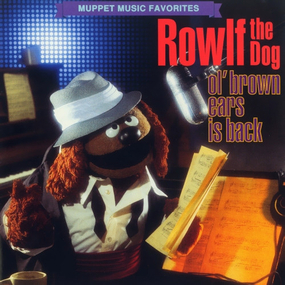
Ol' Brown Ears Is Back is an album released by The Jim Henson Company through BMG Kidz in 1993. The album consists of 14 songs recorded by American puppeteer Jim Henson as the Muppet character Rowlf the Dog. Although released three years after Henson's death, the tracks were recorded in 1984. It was released in CD and cassette form, with the latter including a poster.

The Muppet Show is the first soundtrack album released from the TV show of the same name. It reached number one in the UK Albums Chart in the week ending 25 June 1977. In 1979, the album won The Grammy Award for Best Album for Children.
Camille Bonora is a former Muppet performer. She currently serves on the board of BibleMesh online theological studies, as well as a member of the Kairos Journal editorial board.
References
- 1 2 Philip Furia, Michael L. Lasser (2006-05-12). America's songs. p. 160. ISBN 978-0-415-97246-8.
- ↑ Meyerson, Harold; Harburg, Ernie (1995). Who Put the Rainbow in the Wizard of Oz?: Yip Harburg, Lyricist. University of Michigan Press. pp. 161–163. ISBN 0-472-08312-0.
- ↑ Sherrin, Ned (2008). Oxford Dictionary of Humorous Quotations. OUP Oxford. p. 35. ISBN 978-0-19-923716-6.
- ↑ Archived at Ghostarchive and the Wayback Machine : "Lydia the Tattooed Lady (with WWII Hitler reference) - Groucho Marx on Radio". YouTube .
- ↑ "Capitol Steps - Thank God I'm a Contra Boy Album Reviews, Songs & More | AllMusic". AllMusic .